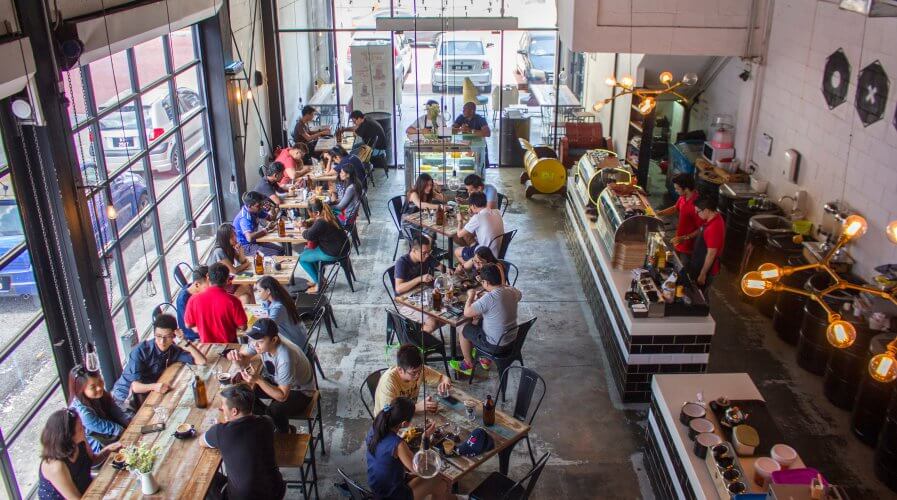
Fave Malaysia is on a mission to help restaurants across the country to grow digitally. Source: Shutterstcok
Why Fave is trying to digitize 100,000 restaurants in Malaysia
DIGITAL transformation is making great progress in Malaysia. Businesses big and small are increasingly adopting emerging technologies to enhance their value to their customers while ramping up productivity and efficiency.
However, restaurants, one of Malaysia’s biggest industries is apparently lagging in its digital journey, prompting several companies to form a collaboration to remedy the situation.
The initiative, known as Growth Malaysia which is spearheaded by Fave Malaysia, is planning to help some 100,000 offline food outlets across the country to adopt digital solutions in all aspects of the business; including payments, marketing, data, and financial services.
Tech Wire Asia caught up with Fave Malaysia’s founder and CEO Joel Neoh to take a deep dive into his company’s purported mission to digitize the country’s food industry.
Getting restaurants on board
“We see that consumers in Malaysia, they’re quite digitally savvy. All of us have a mobile phone. In fact, out of the 32 million people, 22 million people in Malaysia have smartphones.
“That a pretty high penetration rate,” Joel said.
And since the Malaysian public is sufficiently digitized according to him, businesses should be brought up to speed especially the small and medium enterprises (SMEs) that contributes up to 37 percent of the country’s GDP.
To do so, Joel opined that the front end of a restaurant would be a great starting point for a business to adopt a technological solution such as electronic payment platform or modern POS system, where the consumers are already able to pay and order using their mobile phones.
Moreover, restaurants could reward their customers using a digital loyalty card app, distribute coupons and promotional items and reach a greater market access.
“But then it doesn’t end there,” Joel said, adding that once businesses start adopting that piece, they can then begin to implement technology to their backend operations, as well as sourcing for produce.
“Few of the businesses have already asked us if we could help them with the digitalizing their supply chain.”
But Fave realize that they can’t take on this project on their own.
“We can help with some part of the digitization’s journey, and other companies and government agencies could help in other parts,” said Joel which is why they’ve recruited others to help them out in their digitalization mission.
Growth Malaysia’s other strategic digital partners include; Grab, Maybank, Malaysia Digital Economy Corporation (MDEC), Funding Societies and Productivity Nexus for Retail & F&B.
Data-driven initiatives
By going digital and signing up with digital partners that process mobile payments and loyalty programs, restaurants would be able to collect important data on customers and general performance of the business, which according to Joel could help restaurants get credit from banks.
“To get a loan, you need three years of financial records, but most businesses in the food and beverage industry fold within three to five years.
“It takes restaurant owners a few years to build a good brand, but within those years, they can’t get any access to funds or financial services, which starts this crazy vicious cycle of banks being averse to lending to restaurants due to high risks and restaurants failing due lack of funding,” Joel explained.
This is where data will be invaluable for the restaurant industry whereby within the first few months a restaurant’s digital partners such as Fave or Grab would be able to generate data and gather insights on the restaurant’s performance to obtain a line of financing.
“The process is similar to how tech startups acquire fundings,” said Joel.
With financial providers and government agencies present within the Growth Malaysia initiatives, the potential for a revolutionary breakthrough is endless.
Beyond that data would also businesses to always stay relevant to the current trends and market signals, especially when in the food industry.
All things considered, digitization may seem like a luxury to many businesses at first, or enterprises that are already thinking about digital transformation may not know where to start.
But thanks to initiatives such as Growth Malaysia, help is not too far away for businesses wanting to fulfill their business potential and serve their customers better or just to ensure their very survival.
READ MORE
- Strategies for Democratizing GenAI
- The criticality of endpoint management in cybersecurity and operations
- Ethical AI: The renewed importance of safeguarding data and customer privacy in Generative AI applications
- How Japan balances AI-driven opportunities with cybersecurity needs
- Deploying SASE: Benchmarking your approach






